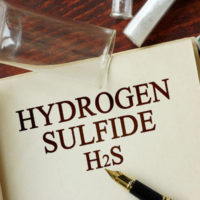MENU
- Home
- Overview
- Attorneys
- Practice Areas
- Firm News
- Blog
- Contact
 Hydrogen sulfide is a highly combustible gas that smells like rotten eggs. In high concentrations, the gas can cause explosions, health complications, and fire when not properly handled. Recent news reports of evacuations from sports fields located near landfills have sparked new concerns about potential exposure to the gas.
Hydrogen sulfide is a highly combustible gas that smells like rotten eggs. In high concentrations, the gas can cause explosions, health complications, and fire when not properly handled. Recent news reports of evacuations from sports fields located near landfills have sparked new concerns about potential exposure to the gas.
Hydrogen sulfide is a gas formed naturally in crude petroleum, natural gas, volcanic gas, hot springs, agriculture, and in the decomposition of trash and human or animal waste. Exposure of small amounts of hydrogen sulfide is not a concern, but when the gas becomes concentrated, it can lead to life-threatening complications.
In high concentrations, hydrogen sulfide can cause health complications. Symptoms of hydrogen sulfide exposure become more severe with prolonged exposure.
Whenever symptoms appear when there is a rotten egg odor, victims should be removed from the area and placed in a well-ventilated space.
Anyone working with or exposed to concentrated levels of hydrogen sulfide should be trained in the proper handling of this gas. Safety hazards associated with hydrogen sulfide include:
Workers exposed to concentrated levels of hydrogen sulfide carry the greatest risk of complications. Those who work in confined spaces, such as manholes, sewers and sewer lines, basements, drilling, refineries of petroleum and natural gas, and those that handle or store wastewater or manure need to be properly trained on how to handle hydrogen sulfide and how to recognize symptoms of exposure to toxic levels of the gas.
While the general public is not normally at risk for hydrogen sulfide complications, there have been recent reports of high concentrations of the gas in outdoor areas. A soccer field was recently evacuated in northern New Jersey after dangerous levels of hydrogen sulfide were detected in the air. The soccer field is adjacent to a landfill, where the gas can build up to high levels from decomposition of organic materials.
Not only is the smell of rotten eggs offensive to residents in the area of the landfill, but evidence of high concentrations of the gas were so strong that residents worry about the effects of long-term exposure. The New Jersey Sports and Exposition Authority owns and operates the landfill and has called on engineers to design a new gas collection and control system to address the odor problem.
If you believe you were exposed to toxic levels of hydrogen sulfide, contact the Delaware environmental lawyers at Jacobs & Crumplar, P.A. today. Call us at 302-656-5445 or contact us online to schedule a free consultation today. Located in Wilmington and Millsboro, Delaware, we serve clients throughout Dover, New Castle County, and Sussex County.